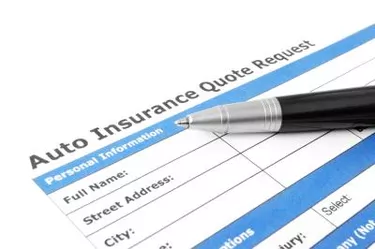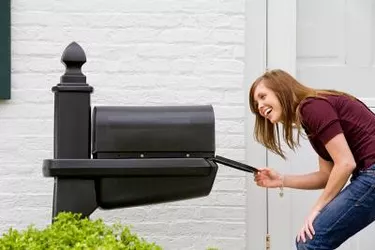
If you are moving to another state, there are certain things that you have to do. Many of these things are the same as when you move in-state: securing movers, finding a new place to live and packing up your items to get ready to move. However, when moving to a different state, there are certain additional requirements you need to be aware of that you should put on a checklist.
Check with insurance carriers
Video of the Day

Car insurance rules and laws differ by state. In fact, if you have a small local insurance company, they may not even be licensed to provide you with car insurance in your state. Furthermore, minimum liability laws may be different in your new state. Before you move, call your car insurer to find out what changes you need to make to your policy and how long you have to do so. A similar phone call should be made to your health insurance provider; different policy rules may apply and you may need to get a guest membership in your new state or get a different or new policy to be protected.
Video of the Day
Declutter

Before you move, it can be a great idea to go through your items and get rid of things you do not need any more. De-cluttering can be especially important when moving to a new state, as you will have to pay for the cost of moving and transporting items. Generally, the less you have to move, the lower your cost. It will also be helpful to have less to pack, and less to unpack when you get to your new home.
Pack Carefully

Packing to move to a new state can be a bit more complex than simply packing to move to your existing state. Different states may have certain laws about items such as guns, mace or pepper spray. If you own any of these items, or any other "dangerous" items such as pesticides that may have different regulations on a state by state basis, make sure you verify the new laws in the state you are moving to so you don't accidentally violate a law.
Banking

Before you move, you will also want to see if your bank has a local branch in your new state. If there are no convenient ATMs or banks, you may have a difficult time making deposits or getting access to your money without paying out-of-network ATM fees. Plan accordingly by opening a new bank account with a branch in your state.
Forward Your Mail

Before you move, you will also need to change your legal address. When you do so, forward your mail. You can fill out forms online at the U.S. Postal Service website or you can fill out a mail forwarding request in person at the post office. If you change your address online or via phone, you will be charged a $1 verification fee. The USPS recommends you fill out and submit your change of address forms at least two weeks before moving. You can specify on the form the date that the mail will begin forwarding. First class mail and express mail will be forwarded to your new address for up to 12 months, while magazines are forwarded for 60 days.
Car Registration

You will also need to change your car registration when you move to a new state. The amount of time you have to do this varies by state. Some states require you to register your car within the first 30 days, while others (such as Nevada, for example) will give you up to 60 days. Before moving to a new state, you should check with the DMV in your existing state to determine your obligations. You may have to send back your in-state license plates, for example. Upon moving, contact your new DMV to find out the time period for registering your car and the requirements. Different states may have different requirements; for example, in California, you have to get an emissions inspection when registering your car. After you have found out and complied with the specific requirements, you will need to go to to the DMV. You usually need to have an in-state drivers license to register your car within the state, so you may have to do this first. You will also need to bring proof of title, proof of insurance and other necessary forms as required by the individual state.
Utilities

You will also need to cancel all utilities in your name at your existing address and get utilities set up in your name at your new address. Utilities can include water, power, gas, telephone, and various other services you pay for on a monthly basis. Check a list of your recurring bills that you have paid over the past few months in order to determine what needs to be canceled. Don't forget to also cancel Internet service and garbage pickup or snow plowing services, for example. When you contact the utility company, tell them the day as of which you want service canceled, making sure not to shut off the power before your actual move (perhaps even set the date as the day after you are scheduled to move, so if something unforeseen happens, you won't be left without lights). When you do cancel your utilities, make sure you give the company a forwarding address so they can send you a final invoice. You will also want to set up the utilities in your new home to be in your name beginning a day before your arrival if possible, so you don't get here to a home with no utilities. Call the utility companies in your state to make these arrangements.